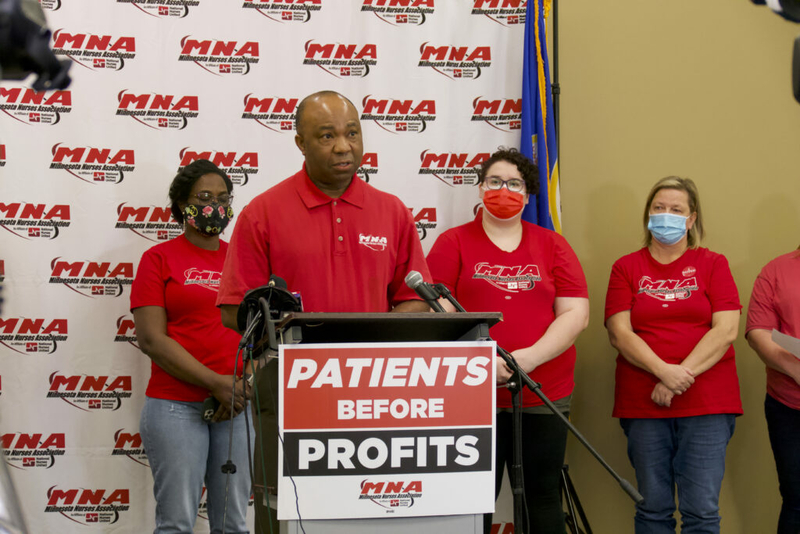15,000 Minnesota nurses to strike beginning Dec. 11

The union representing 15,000 nurses in the Twin Cities and Duluth area on Thursday announced a strike beginning Dec. 11, the second strike in recent months.
Nurses at 12 hospitals in the Twin Cities and at two Essentia Health hospitals will strike until Dec. 31, while nurses at St. Luke’s hospitals in Duluth and Two Harbors will strike indefinitely.
The strike, which will match the September strike as the largest private-sector nurses strike in U.S. history, will affect hospitals run by M Health Fairview, HealthPartners, Allina Health, Children’s Minnesota, North Memorial, St. Luke’s and Essentia Health.
“We don’t want to be out on that sidewalk. We want to be at the bedside caring for our patients. But the conditions our executives have created in our hospitals are unsustainable,” said Angela Becchetti, a registered nurse at Allina’s Abbott Northwestern hospital and a board member of the Minnesota Nurses Association, during a news conference announcing the strike.
Nurses and hospital management have been unable to resolve differences over pay and staffing levels during nine months of negotiations.
The nurses, who work at 16 hospitals in Minnesota and Superior, Wisc., voted “overwhelmingly” to approve the strike on Wednesday, according to union leadership.
A spokesperson for several Twin Cities’ health systems said their leaders were “shocked and deeply disappointed” at the strike announcement. Hospitals say they will continue to serve patients should a strike occur.
“Let us be clear: the union’s choice to issue 10-day strike notices is theirs and theirs alone. The nurses were not forced to do this and they chose to issue their 10-day strike notices in the midst of the triple threat of illnesses, RSV, COVID and influenza, that are already stressing our health care system,” said spokesperson Paul Omodt, in a statement on behalf of the Twin Cities Hospitals Group.
If they fail to reach a deal in the next 10 days, hospitals will be forced to bring in expensive traveling nurses even as waiting rooms spill over with patients who must wait for hours to be seen.
Nurses say it’s a difficult decision to abandon patients for nearly three weeks, but they say their strike will ultimately lead to better patient care if they’re able to secure a voice in staffing levels.
“We have reached our limits,” said Trisha Ochsner, a nurse at Children’s Minnesota. “(Hospital leaders) do not want nurses involved in the decision-making process, yet their decisions are leading to the decline and failure of the (health) systems.”
Nurses say staffing levels are dangerously low, leading to an increase in patient injuries, and driving health care workers out of the field.
Nursing vacancies in Minnesota have doubled since 2019, and a recent national survey found half of nurses are considering leaving the field in the next year. The most common reason nurses gave was “unsafe staffing” levels.
The Minnesota Nurses Association and the health systems have narrowed the gap in wage proposals significantly since thousands of nurses walked off the job for three days in September.
The union is proposing 20-22.5% wage increases over the next three years, down from 39% at the beginning of negotiations. Some hospitals have countered with as much as 14.5% over three years, the largest raises nurses have seen in 15 years.
The nurses’ union is advocating for committees made up of nurses and hospital administrators to set staffing levels for each hospital unit. Ahead of the strike vote on Wednesday, Minnesota Nurses Association President Mary Turner said that the union had recently backed off its proposal requiring more than half of nurses to approve staffing changes. Their latest proposal would require hospitals to increase staffing if patient injuries, nurse injuries and negative health outcomes pass a certain threshold.
Ceding any authority over staffing levels has been a non-starter for hospitals.
Nurses are also lobbying the state Legislature to force hospitals to increase staffing levels as part of a bill aimed at increasing nurse retention and recruitment.
Hospital leaders have called on the union to agree to independent mediation to help resolve their differences, a request the union has rejected until this week.
Turner has said mediators are only helpful when the two sides are close to reaching a deal, and that she wants to keep nurses face-to-face with hospital representatives at the bargaining table.
Nurses at Methodist and Fairview have agreed to a mediator present in negotiations this week.
The statement on behalf of the Twin Cities Hospitals Group blasted the nurses’ union for calling a strike before beginning the mediation process.
“Not one meeting with mediators has even occurred yet, but the union has elected to pursue a strike rather than settlement. It is clear that their recent statements in support of mediation were disingenuous,” the statement said.








